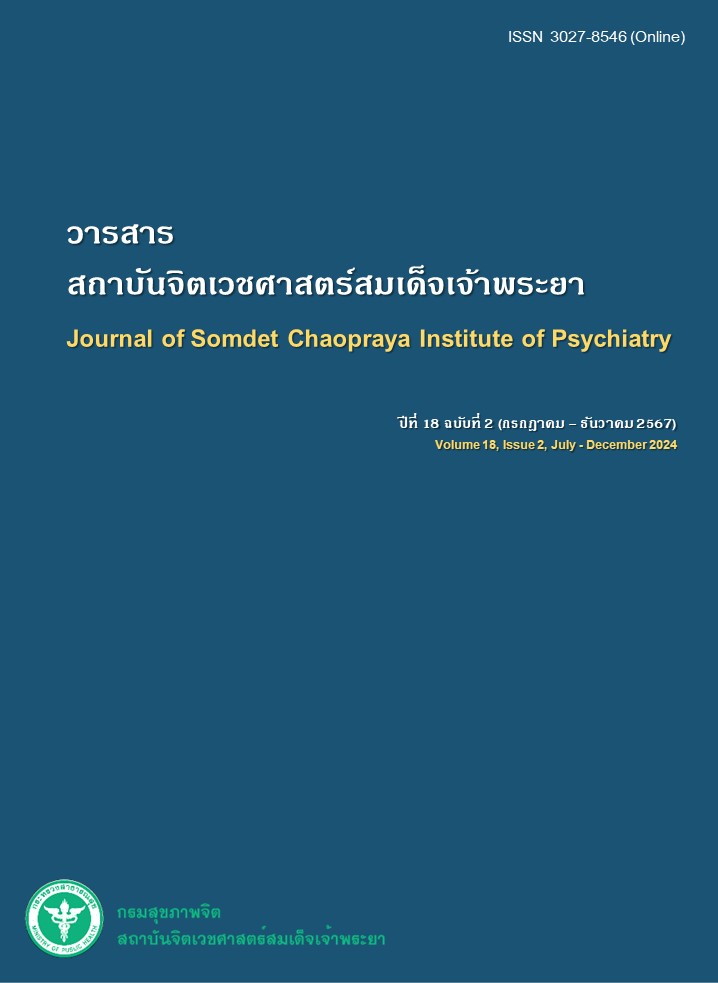การศึกษาความสัมพันธ์ระหว่างความฉลาดทางอารมณ์และความยืดหยุ่นทางจิตใจของนิสิตกลุ่มวิทยาศาสตร์สุขภาพ มหาวิทยาลัยนเรศวร
คำสำคัญ:
ความฉลาดทางอารมณ์, ความยืดหยุ่นทางจิตใจบทคัดย่อ
วัตถุประสงค์ : เพื่อศึกษาความฉลาดทางอารมณ์และความยืดหยุ่นทางจิตใจ เปรียบเทียบข้อมูลส่วนบุคคลกับความฉลาดทางอารมณ์และความยืดหยุ่นทางจิตใจ และศึกษาความสัมพันธ์ระหว่างความฉลาดทางอารมณ์และความยืดหยุ่นทางจิตใจ
วัสดุและวิธีการ : เป็นการวิจัยเชิงสำรวจ การเก็บข้อมูลโดยใช้แบบสอบถามออนไลน์ในนิสิตกลุ่มวิทยาศาสตร์สุขภาพ มหาวิทยาลัยนเรศวร ระหว่างเดือนตุลาคม พ.ศ. 2565 ถึงเดือนตุลาคม พ.ศ. 2566 เครื่องมือที่ใช้ ได้แก่ แบบสอบถามข้อมูลส่วนบุคคล แบบประเมินความฉลาดทางอารมณ์ สำหรับอายุ 18 - 60 ปี และแบบประเมินความยืดหยุ่นทางจิตใจ (CD-RISC) ฉบับภาษาไทย สถิติที่ใช้ คือ ความถี่ ร้อยละ ค่าเฉลี่ย และส่วนเบี่ยงเบนมาตรฐาน วิเคราะห์ข้อมูลเชิงปริมาณโดยใช้สถิติความแปรปรวนแบบสองทาง สถิติการวิเคราะห์ความแปรปรวนแบบทางเดียว และศึกษาความสัมพันธ์ด้วยการวิเคราะห์สหสัมพันธ์เพียร์สัน
ผล : กลุ่มตัวอย่างทั้งหมด 370 คน ส่วนใหญ่เป็นเพศหญิง ร้อยละ 80.5 ศึกษาอยู่ในชั้นปีที่ 3 ร้อยละ 33.8 เกรดเฉลี่ยตั้งแต่ 3.50 ขึ้นไป ร้อยละ 41.4 และรายได้ต่อเดือนอยู่ระหว่าง 4,001 - 6,000 บาท ร้อยละ 33.2 พบว่า เพศ ชั้นปีที่ศึกษา เกรดเฉลี่ยที่ต่างกัน มีความฉลาดทางอารมณ์และความยืดหยุ่นทางจิตใจไม่แตกต่างกัน แต่ระดับความฉลาดทางอารมณ์อยู่ในเกณฑ์เฉลี่ย (Mean = 156.3, S.D. = 17.32) และความยืดหยุ่นทางจิตใจสูง ร้อยละ 99.2 รายได้ต่อเดือนที่แตกต่างกัน มีความความฉลาดทางอารมณ์แตกต่างกันอย่างมีนัยสำคัญทางสถิติที่ระดับ 0.05 และความฉลาดทางอารมณ์และความยืดหยุ่นทางจิตใจ มีความสัมพันธ์กันทางบวกในระดับปานกลาง (r = 0.337) อย่างมีนัยสําคัญทางสถิติที่ 0.05
สรุป : นิสิตกลุ่มวิทยาศาสตร์สุขภาพ มหาวิทยาลัยนเรศวร มีความฉลาดทางอารมณ์อยู่ในเกณฑ์เฉลี่ย และความยืดหยุ่นทางจิตใจสูง รายได้ต่อเดือนที่แตกต่างกันมีความฉลาดทางอารมณ์ที่แตกต่างกัน และความฉลาดทางอารมณ์และความยืดหยุ่นทางจิตใจมีความสัมพันธ์กันทางบวก
เอกสารอ้างอิง
Hongthong A. The hospital development model to achieve advanced quality. International Academic Multidisciplinary Research Conference in Vienna. 2023; 20: 252-5.
Goel V, Vartanian O. Negative emotions can attenuate the influence of beliefs on logical reasoning. Cogn Emot 2011; 25(1): 121-31.
Gross JT, Cassidy J. Expressive suppression of negative emotions in children and adolescents: Theory, data, and a guide for future research. Dev Psychol 2019; 55(9): 19-38.
Joseph JM. The resilient child: Preparing today’s youth for tomorrow’s world. New York: Plenum; 1994.
Brewer J, Cadman C. Emotional intelligence: Enhancing student effectiveness and patient outcomes. Nurse Educ 2000; 25(6): 264-6.
Mancini G, Biolcati R, Joseph D, Trombini E, Andrei F. Emotional intelligence: Current research and future perspectives on mental health and individual differences. Front Psychol 2022; 13: 1-3.
Segal J, Smith M, Robinson L, Shubin J. Improving Emotional Intelligence (EQ): Emotional intelligence affect’s. Help Guide 2022; 5: 1-5.
รัศมี มณีนิล. ความฉลาดทางอารมณ์: อีคิวคืออะไร. นนทบุรี: กรมสุขภาพจิต; 2560.
กรมสุขภาพจิต. เปลี่ยนร้ายกลายเป็นดี พลังสุขภาพจิต RQ : Resilience Quotient. นนทบุรี: สำนักวิชาการสุขภาพจิต กรมสุขภาพจิต; 2563.
Grant L, Kinman G. Emotional resilience in the helping professions and how it can be enhanced. HSC 2014; 3(1): 23-34.
American Psychological Association. The road to resilience. APA PsycNet; 2004: 227-9.
Hussain R, Guppy M, Robertson S, Temple E. Physical and mental health perspectives of first year undergraduate rural university students. BMC 2013; 13(1): 1.
Herbst U, Voeth M, Eidhoff AT, Müller M, Stief S. Studierendenstress in Deutschland – Ene Empirische Untersuchung Bd, vol. 85. Berlin: AOK Bundesverband; 2016.
Van Rooy DL, Viswesvaran C. Emotional intelligence: A meta-analytic investigation of predictive validity and nomological net. J Vocat Behav 2004; 65(1): 71-95.
Nelson CA. Neural plasticity and human development. Curr Dir Psychol 1999; 8(2): 42-5.
Akeman E, Kirlic N, Clausen AN, Cosgrove KT, McDermott TJ, Cromer LD, Paulus MP, Yeh HW, Aupperle RL. A pragmatic clinical trial examining the impact of a resilience program on college student mental health. Depression and Anxiety 2020; 37(3): 202-13.
VanBreda AD. Resilience of vulnerable students transitioning into a South African university. High Educ 2018; 75: 1109-24.
Gardner H. Frames of mind: The theory of multiple intelligence. New York: Basic Books; 1983.
รุจิกาญจณ์ เหลี่ยมเจริญ. ความฉลาดทางอารมณ์ของนิสิตแพทย์ชั้นปีที่ 6 มหาวิทยาลัยนเรศวร [วิทยานิพนธ์มหาบัณฑิต]. พิษณุโลก: มหาวิทยาลัยนเรศวร; 2560.
วัลลพ ล้อมตะคุ, สิทธิชัย ลีวิวัฒน์วงศ์, สิริเกียรติ รัชชุศานติ. ปัจจัยที่มีผลต่อการมีเงินออมของนักศึกษาระดับอุดมศึกษาในประเทศไทย. Rajapark Journal 2566; 17(51): 192-204.
Tsurugano S, Nishikitani M, Inoue M, Yano E. Impact of the COVID-19 pandemic on working students: Results from the Labour Force Survey and the student lifestyle survey. J Occup Health 2021; 63(1): e12209.
Ching SS, Cheung K. Factors affecting resilience of nursing, optometry, radiography and medical laboratory science students. Int J Environ Res Public Health 2021; 18(8): 38-67.
Ang WH, Shorey S, Lopez V, Chew HS, Lau Y. Generation Z undergraduate students’ resilience during the COVID-19 pandemic: a qualitative study. Curr Psychol 2022; 41(11): 8132-46.
Pertegal-Felices ML, Valdivieso-Salazar DA, Espín-León A, Jimeno-Morenilla A. Resilience and academic dropout in ecuadorian university students during Covid-19. Sustainability 2022; 14(13): 8066.
Auttama N, Seangpraw K, Ong-Artborirak P, Tonchoy P. Factors associated with self-esteem, resilience, mental health, and psychological self-care among university students in Northern Thailand. J Multidiscip Healthc 2021: 1213-21.
Quintiliani L, Sisto A, Vicinanza F, Curcio G, Tambone V. Resilience and psychological impact on Italian university students during COVID-19 pandemic. Distance learning and health. Psychol Health Med 2022; 27(1): 69-80.
Wu Y, Yu W, Wu X, Wan H, Wang Y, Lu G. Psychological resilience and positive coping styles among Chinese undergraduate students: a cross-sectional study. BMC Psychology 2020; 8(1): 1-11.
Di-Fabio A, Saklofske DH. Promoting individual resources: The challenge of trait emotional intelligence. Pers Individ Dif 2014; 65: 19-23.
Trigueros R, Padilla AM, Aguilar-Parra JM, Rocamora P, Morales-Gázquez MJ, López-Liria R. The influence of emotional intelligence on resilience, test anxiety, academic stress and the Mediterranean diet. A study with university students. Int J Environ Res Public Health 2020; 17(6): 20-71.
Bano Z, Pervaiz S. The relationship between resilience, emotional intelligence and their influence on psychological wellbeing: A study with medical students. Pak Armed Forces Med J 2020; 70(2): 390-4.
ดาวน์โหลด
เผยแพร่แล้ว
รูปแบบการอ้างอิง
ฉบับ
ประเภทบทความ
สัญญาอนุญาต
ลิขสิทธิ์ (c) 2024 วารสารสถาบันจิตเวชศาสตร์สมเด็จเจ้าพระยา

อนุญาตภายใต้เงื่อนไข Creative Commons Attribution-NonCommercial-NoDerivatives 4.0 International License.
บทความที่ได้รับการตีพิมพ์เป็นลิขสิทธิ์ของวารสารสถาบันจิตเวชศาสตร์สมเด็จเจ้าพระยา



